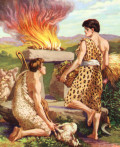Sentence Pronounced on Cain: Page 3 of 3 (series: Lessons on Genesis)
by John Lowe
(Woodruff, S.C.)

15 And the LORD said unto him, Therefore whosoever slayeth Cain, vengeance shall be taken on him sevenfold. And the LORD set a mark upon Cain, lest any finding him should kill him.
And the LORD said unto him, Therefore whosoever slayeth Cain, vengeance shall be taken on him sevenfold.
There has been no law given at this time. Cain is a sinner, but he is not a transgressor, because there has been no law given about murder. His great sin was that he did not bring an offering that was acceptable to God. His deeds were evil in what he brought to God, and he showed his evil nature by killing his brother.
To be banished from the presence of God was a curse. Cain left his home, left his father Adam and his other children; not being allowed to continue any longer with them, or converse with them, after he had been guilty of such a horrible crime; and went to live in the land of Nod (lit., “wandering”), which was east of Eden—“So Cain went out from the LORD's presence and lived in the land of Nod, east of Eden (Gen 4.16)—a land given that name either because of his wandering up and down in it; being unable to stay in one place, or because his mind was restless and uneasy. It is thought by many that the land of Nod may have been Arabia-Petræa—which was cursed with sterility on his account. Jarchi mentions another reason for its name, which was that in every place where he went the earth shook under him, and men said, Depart from him, this is he that slew his brother.
And the LORD set a mark upon Cain, lest any finding him should kill him.
God did a strange thing; He assured him of His continuing presence and unending protection. He put a mark on Cain to indicate that he belonged to the Lord God, a sign that would protect him from anyone who wanted to kill him. At the same time, the mark that saved him was a lifelong sign of his shame. There is no evidence that the mark of Cain’ was a sign to announce to the world that he was a murderer. It was, instead, a special mark of loving care and protection. The Holy Spirit has chosen not to reveal to us what this mark was or why people would recognize it as God’s protective seal; but it worked. The speculation of the best commentators is that the mark was a wild ferocity of countenance that made him the object of universal horror and avoidance. Cain would continue always in the safekeeping of the covenant God. Whatever this mark was, it was, no doubt, well known to all concerned, both as a brand of infamy on Cain, and as a sign from God that they should not kill him. Though a murdered, he was the recipient of God’s favor. This was purely an act of mercy, on God’s part.
This brings yet another question to mind; “Why would God allow a diabolical murderer like Cain to go free?” Why does he continue to offer forgiveness and salvation to murderers, rapists, and child molesters? Now, this is something very important for us to see—In His mercy, God doesn’t give us what we deserve; and in His grace He gives us what we don’t deserve. That is the nature of God. God spared Cain’s life, but that wasn’t the end of the story. Eventually Cain died and “after this the judgment” (Heb. 9.7). “After this the judgment,” refers to the last and general judgment, which will befall all men, the quick and dead, the righteous and wicked, and in which Christ will be the Judge. There is a particular judgment which happens immediately after death; by virtue of which, the souls of men are appointed to their proper state of happiness or of despair; and there is a universal judgment, which will be after the resurrection of the dead, and is called eternal judgment, and the judgment to come; this has been prearranged by God, though the time when it will occur is unknown to men; yet nothing is more certain, and it will be a righteous judgment. The entire civilization Cain built was destroyed by the Flood, but the record of his life is left in the Scripture as a warning to anyone who pretends to worship, play with sin, and doesn’t take sin seriously. “The way of Cain” (Jude 11) is not the narrow way that leads to life—“Enter ye in at the strait gate: for wide is the gate, and broad is the way, that leadeth to destruction, and many there be which go in thereat: Because strait is the gate, and NARROW IS THE WAY, which leadeth unto life, and few there be that find it” (Matt. 7.13, 14).
Cain was protested by this Divine declaration, so that the sentence he was under, that he would “be a fugitive and a vagabond,” would be enforce for as long as God allowed him to live “on the earth.” God has wise and holy purposes for protecting and prolonging the lives of very wicked men
No content on preachology.com may be printed or
copied to any other site without permission.
|
The Preaching Ezine Subscribe to my free newsletter for monthly sermons and get a free book right now. Just follow the link above and get the details! |
|
Sermon Supply Ministry
Be ready for Sunday…before Saturday night! |
|
Manna Seminary
Did you ever want to start or finish your Ministry Training? |
|
YOUR PAGES: by sharing YOUR great sermons! by sharing YOUR great poems! |



